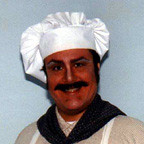Café La Ruche, a phrase meaning "beehive cafe," is in an old, narrow building up a steep hill from the waterfront. Inside is modern and comfortable though, with relaxing beige walls and upholstery. French art posters, photographs, and street signs decorate the walls. In the far end is a service area and a large dessert case. A singer-guitarist also sat back in that area, and we got to hear him sing a variety of older international pop songs in a variety of languages.
The food here appears to be simple, basic, traditional foods—sort of the equivalent of a French diner. Of course, the French have different ideas of "comfort foods" than Americans, so I saw a lot of things like whole artichokes, bowls of mussels, coq au vin, French style salads, quiches, French sandwiches, pates, lots of soups, and so forth. While we looked over the menus, we were given some of the most wonderful big, round, crusty rolls. I do so love French breads!
We started by splitting an order of lamb sausages. These links had been fried to a nice crispness on the casings, and inside, the lamb meat was highly seasoned with lots of cayenne pepper, and I think I also detected traces of rosemary, anise seed, and French salt. They were served on top of slices of French bread, which caught the flavorful grease and juices, providing an additional treat.
Fr. Steven chose the shepherd's pie for his main course. It was served in a large au gratin dish with the top layer of mashed potatoes broiled to a golden brown, and he reported a strong wine taste in the sauce. It came with a big plate of a romaine salad. I had the Swiss fondue. They brought me a big plate of sliced carrots and zuccini, broccoli florets, and cubes of French bread. The fondue pot device, however, was a little bit frightening. There was no means of controling the Sterno under the pot, so it blazed on "high", putting the pot of cheese and wine into a rapid boil. It was also a bit rickety, and I worried I would knock the pot off the rack, spilling hot wine all over everyone. The pot handle was metal and very hot, so I had to remember to use my napkin when I needed to move or adjust the pot. Eventually towards the end of the course, I had to make the decision to put the cap on the Sterno and completely extinguish the flame, since the cheese was starting to scortch on the bottom on the pot. I guess they were aware of their uncontrolled flames, since they had the melted cheese in what I at first thought was an excessive amount of white wine. It did seem to work out okay in the end, though. I would have used a bit more kirschwasser in the liquid, but it was still good.
For dessert, we had to inspect the dessert case.
Hidden on the right side of the case by Fr. Steven's glasses was a pretty little chocolate almond meringue frosted in whipped cream that he ate. I had an apple dumpling, which is pictured in the very middle of the case. My apple had been peeled and cored and wrapped in croissant dough, then baked. A dollop of French dark chocolate garnished the top. They did, however, commit the ultimate sin with my apple dumpling: they microwaved it. Microwave energy is scientifically known to change the molecular bonds in the gluten in breads and pastries, making them tough and rubbery, not to mention the fact that the microwave often gets food too hot. Had I known they were going to nuke the dumpling instead of warm it in a regular thermal oven, I would have preferred my dumpling cold.
I'm looking forward to a chance to go back to Café La Ruche again soon. Their simple food is delicious and best of all, the prices are extremely, surprisingly reasonable. While we weren't drinking last night, they also had a nice selection of wines by the bottle and by the glass.

No comments:
Post a Comment